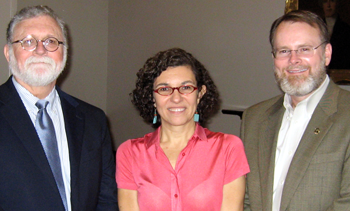Dr. Ana Diez Roux, epidemiologist and Delta Omega speaker, calls for bringing 'population' back into population health research
March 26, 2012
 Dr. Robert McKeown, left, chair of the Department of
Dr. Robert McKeown, left, chair of the Department of
Epidemiology and Biostatistics, with Dr. Ana Diez Roux,
Delta Omega speaker, and Dr. Tom Chandler, dean
of the Arnold School.
The fate of a person's health can be determined simply by the street where one lives, an internationally noted epidemiologist told a group of scholars Friday in a stark example of the complex issues investigators face in designing effective research strategies.
That was among the observations made by Dr. Ana Diez Roux, the featured speaker at the annual Delta Omega Lecture of the Arnold School of Public Health. Recently named chair of the Department of Epidemiology at the University of Michigan's School of Public health, Diez Roux is also director of the its Center for Social Epidemiology and Population Health. The title of her program was "Transcending Impasses in Population Health Research: Can Complex Systems Help?"
Noting that seemingly simple factors such as one's neighborhood street or lane can have profound health consequences, Diez Roux described the extensive range of group and population-level variables. Personal health can be affected significantly by differences in neighborhood outlets for physical activity, one's perception of personal safety, the possibility for violence and the recreational habits and preferences of those living nearby.
"It has become apparent that integrating factors across levels and also putting together social and biological processes is crucial," she said. "Another feature has been increasing recognition that policies that people don't usually think of as health related may have important policy implications because they affect the system in various, sometimes unpredictable ways."
Describing the multilevel analysis required in health research, Diez Roux alluded to the ancient Greek poet Archilochus, who wrote, "The fox knows many things, but the hedgehog knows one big thing."
Today's epidemiologists have to know many things, she said, noting, "Over time, population health research has become much more interested in figuring out ways to integrate factors at various levels of organization, from society to genes."
A research professor in the Survey Research Center in the Institute for Social Research, Diez Roux also is director of the Robert Wood Johnson Health and Society Scholars Program at the University of Michigan.
She is considered an international leader in the investigation of the social determinants of health, the application of multilevel analysis in health research, and the study of neighborhood health effects. Her research areas include social epidemiology and health disparities, environmental health effects, urban health, psychosocial factors in health, and cardiovascular disease epidemiology.
Recent areas of work include social environment-gene interactions and the use of complex systems approaches in population health. Her research and other scholarly programs are supported by the National Institutes of Health, the Environmental Protection Agency and the Robert Wood Johnson Foundation.
She earned her medical degree from the University of Buenos Aires and was chief resident of general pediatrics at the Ricardo Gutierrez Children's Hospital. Before joining the faculty at the University of Michigan, Diez Roux was an assistant professor of epidemiology at the Joseph L. Mailman School of Public Health at Columbia University and an assistant professor of medicine in the Department of Medicine at Columbia's College of Physicians and Surgeons.
Diez Roux serves on numerous review and advisory committees and was awarded the Wade Hampton Frost Award for her contributions to public health by the American Public Health Association. She was elected to the Institute of Medicine of the National Academy of Sciences in 2009. She earned a master's degree in public health and a doctorate in health policy from the Johns Hopkins School of Hygiene and Public Health.
The Delta Omega Honorary Society in Public Health was founded in 1924 at Johns Hopkins University within the School of Hygiene and Public Health, now known as the Bloomberg School of public health.
The Delta Omega Lecture Series at the USC's Arnold School brings the nation's leading scholars to campus to discuss the most important topics in public health education and research. The Arnold School's Mu Chapter was established in 1978, three years after the School of Public Health was founded at USC.



_01.jpg)